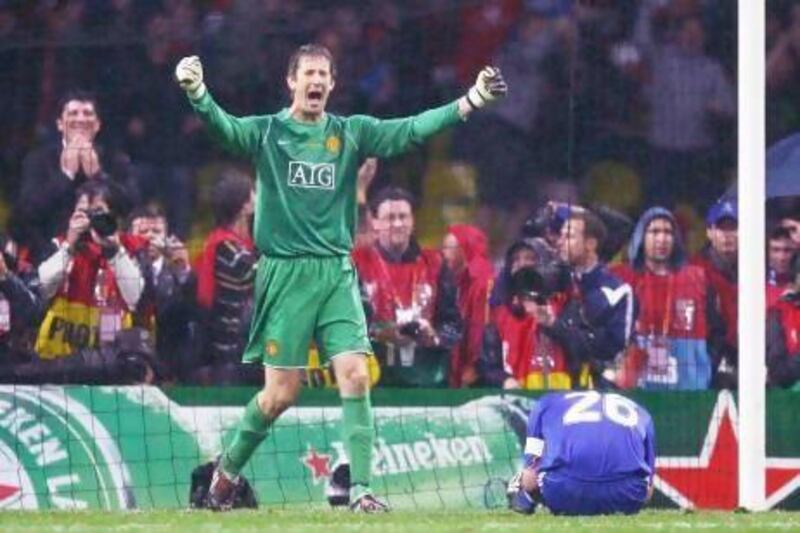Sometimes, the game of football is achingly simple.
"I better make sure I save this one, because if he scores, they're going to win."
As he stood waiting for John Terry to take Chelsea's fifth penalty of the 2008 Champions League final shoot-out, Edwin van der Sar's night, maybe career, and life, at the particular moment, was reduced to a zero-sum game.
Of course, he didn't need to make the save; Terry slipped, famously scuffing his shot onto the post, and minutes later the Manchester United keeper was celebrating the finest moment of van der Sar's career.
Nothing focuses a goalkeeper's mind more than a penalty shootout. All the pressure is invariably on the kicker; the glory, potentially, all his.
But being a goalkeeper is rarely that straightforward. It's the loneliest position on the pitch, and football wisdom dictates that only those with a certain type of mentality would want to play in that spot. It helps, we're told, if you're crazy.
The notion of the goalkeeper as the outsider, psychologically speaking, is well established. In reality, however, he is increasingly anything but. Over the past two decades, he has had to adapt to becoming a footballer as much as goalkeeper. These days, the ball spends as much time, if not more, at his feet as in his hands.
Van der Sar's career as a senior professional started only two years before the introduction of the back-pass rule.
Luckily, he could hardly have been at a better club to help through the transition.
"The rule was introduced in 1992, and the day after we started training at Ajax with our feet. It's a big part of the philosophy there to play out from the back, to keep possession of the ball," said Van der Sar, now Ajax's director of marketing. "So if the ball is on the right and the defender is being closed down, he needs to be able to play it back towards me and I have to be able to pass the ball with my left foot to the left back."
The most specialised of roles has had to evolve perhaps quicker than any other position on the football pitch.
"Nowadays, many footballers can only play with one foot, but goalkeepers have to be able to play with two feet," the 42-year-old Dutchman said.
"Especially when you're in the middle of the park and players are charging you down. It's more challenging now to be a goalkeeper."
For goalkeepers, the challenges don't stop there. Van der Sar enjoyed phenomenal success with Manchester United, but the physical nature of the English Premier League meant his successor, David De Gea, struggled to settle in after signing from Atletico Madrid.
Van der Sar said that was to be expected and that the extra scrutiny on goalkeepers can go too far.
"He had a difficult time when he first came from Spain, where there is a different mentality, a different way that football is played compared to the physical game in England," he said, adding that Pepe Reina faced the same challenge when he joined Liverpool.
"I think De Gea had to get used to that for a year, but the last six months, he's been playing fantastic for United."
Van der Sar concedes that a goalkeeper can feel quite alone when things do not go well, but suggests the best learn to deal with it.
His hardest times came during the 1999/00 season in Italy, which followed not long after Van der Sar's career-low point: a penalty shoot-out loss to Brazil in the 1998 World Cup semi-final.
"That was, of course, a big disappointment," he said. "It would have been great to have won something with your country."
When asked if he believed Holland had the world's best team in France, the answer was swift. "Yes, I think so."
Van der Sar spent four years at Fulham, between 2001 and 2005, but inevitably, talk always turns to that night in Moscow. Did he believe that United's name was "on the cup" after Terry's miss?
"No, but it was a such a turning point in the game, when the other team has such a setback, mentality-wise, it works in your favour."
Mentality, yet again, the byword.
By the time Nicolas Anelka stepped up to take what turned out to be the last kick of the night, the psychological balance had shifted irreversibly in favour of the goalkeeper. Moments later, thanks to Van der Sar's save, Manchester United were once again Kings of Europe.
"It was fantastic, of course, when you save the penalty and you see your teammates coming towards you," he says of the delirium that followed. "Those first three or four seconds when you realise you've won the cup …"
His voice trails off.
In a career full of highs, he was, at that moment, perhaps more than any other, the most envied footballer on the planet. Unlike those spoilt outfield players, it is not a sensation a goalkeeper experiences very often. But it is the price you pay for the life you choose.
Edwin van der Sar was in Dubai to launch GOAL, a Fifa-approved football centre for children at Dubai Mall.
Follow us
[ @SprtNationalUAE ]





